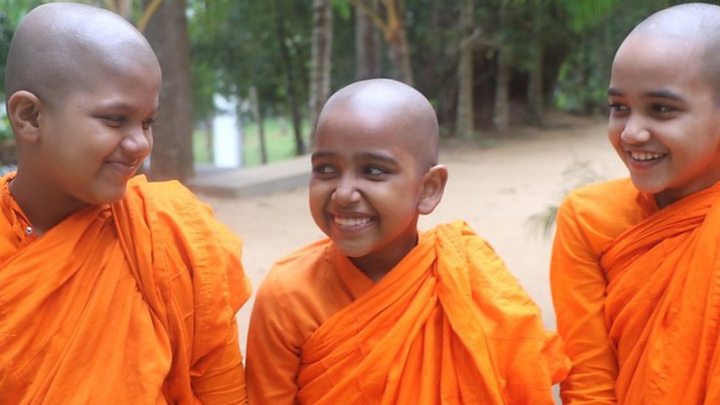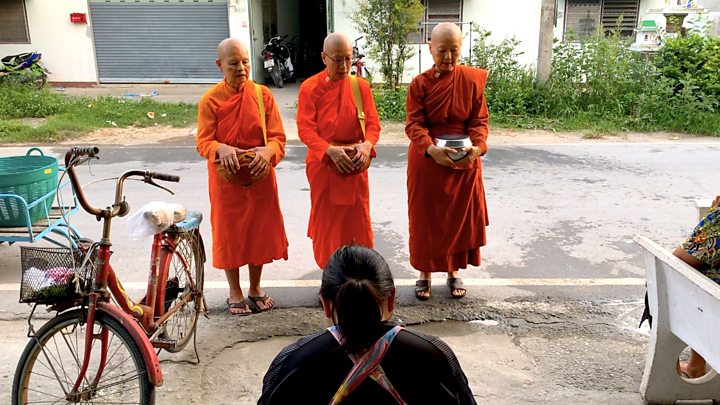The much-loved women denied a name – and a voice
The young nun tells her story through tears.
“I had all the required documents,” Amunuwatte Samanthabhadrika Theri explains. “But the Buddhist Affairs Department refused to issue me an identity card.”
Her tears are unsurprising. After all, an identity card is key to life in Sri Lanka, needed for everything from voting to opening a bank account or getting a passport, applying for a job or sitting exams.
But Samanthabhadrika is not entitled to an identity card. That right was taken away from women like her in 2004, when the country’s influential prelates told the government to stop issuing them identity cards as “Bhikkunis”, or just not to recognise them any longer.
Since then, Buddhist Bhikkunis – the equivalent of Christianity’s nuns – have been trapped in limbo: loved by the communities they serve, but without the same rights.
“We are treated as if we came from another planet. We are discriminated against in every aspect of life,” Kothmale Sri Sumedha Bhikkuni, the country’s most senior nun, tells the BBC. “We are also Buddha’s daughters born on this soil. This is nothing but gender discrimination.”
She is one of 20 nuns who received high ordination in 1998.
‘How cruel are their minds?’
For more than 1,000 years, there were no Bhikkunis in Sri Lanka: their line had died out following years of persecution at the hands of the mainly-Hindu southern Indian kings who had waged war on the island nation.
And then, in 1998, the first new nuns in a millennium were ordained. By the end of the year, there were 150. Today, it is thought there are more than 4,000, some as young as six.
But not everyone was happy. The chief prelates argued that the Bhikkuni Order could not be re-established until the next Buddha appeared, as there are no nuns with higher ordination in the Buddhist tradition practiced in Sri Lanka; and some opposed their very existence.
“Even when Buddha gave permission for a chapter of nuns originally, he hesitated because females are very feeble in this world and can be harassed by others,” a monk called Manta Bhani told the BBC in 1998.
Six years later, the right to an identity card was taken away.
Samanthabhadrika wanted to get a national identity card (NIC) so she could sit her final school exams. In Sri Lanka, nobody can take Advanced Level exams without one.
“The Buddhist Affairs Commissioner said he couldn’t issue the NIC without the permission from chief prelates,” she told the BBC at her temple in Pothuhara, a remote town in north western Sri Lanka.
“I felt very sad. I thought I wouldn’t be able to sit the exam. Then we went to the National Registrar Office. They also refused. At that moment, both my guru Bhikkuni and sister Bhikkuni cried.”
Had Samanthabhadrika been a boy, things would have been very different. Every Buddhist monk over 16 years of age is granted a national identity card in the name they were given when they joined the order, beginning with their place of birth followed by a special Buddhist name.
“Why are we treated differently in this country? How cruel are their minds?” asks Halpanadeniye Supesala Bhikkuni.
More from Sri Lanka
Supesala, a lecturer at Dekanduvela Bhikkuni Training Pirivena, a recently recognised centre in Kaluthara district, is also the co-ordinator of nuns at Sri Lanka’s education ministry.
“Nobody in this country – no other community, religion or ethnic group – has been unfairly treated like us. We are deprived of the basic right of a citizen in this country,” she says.
Together with many other nuns, she has fought a long campaign for equal rights for the Bhikkunis.
But even those who have been successful in getting an identity card have found it is all too easy to take away.
One nun found the “Bhikkuni” on her identity card had disappeared when it was renewed in 2015.
“They have left ‘Bhikkuni’ in Tamil but in Sinhala it was no longer there,” long-time campaigner Thalawathugoda Dhammadeepanee Bhikkuni tells the BBC.
‘Illegal immigrants’
But while most Sri Lankans are unaware of their plight, the nuns are not entirely alone.
They do have support from Dr Inamaluve Sri Sumangala Thero, who is credited with re-establishing the Bhikkuni order in Sri Lanka and is highly critical of most senior chief prelates.
He accuses those who oppose the Bhikkuni order of not properly following Buddha’s teachings. There were no chief prelates during Buddha’s time, he points out.
And he argues that Buddha, after his enlightenment, told all monks to follow his teachings – and not the advice of chief prelates.
There are many liberal monks who support the campaign. But there are also those who feel their influence and popularity among more traditional devotees might wane if they concede equal rights for nuns.
Over the past two decades, Sri Lanka’s nuns have secured a place in devotees’ hearts, thanks to their hardworking and humble ways.
Yet they are still treated like second-class citizens – or worse.
“We are like illegal immigrants,” Supesala tells the BBC. “This is similar to the oppressive attitude of Hindu Brahmins centuries ago.”
You might also be interested in…
Samanthabhadrika did eventually get to sit her exams – although it required special permission from Sri Lanka’s education minister, who only stepped in after her guru made a personal appeal.
She still doesn’t have an ID card – and so will not be allowed to vote when she turns 18.
A spokesman for the chief prelates, Medagama Dhammananda Thero, insists their stance is based upon Buddha’s teaching and has nothing to do with gender discrimination.
The Commissioner General of Buddhist Affairs, Sunanda Kariyapperuma, told BBC Sinhala that the government was ready to add “Reverend”, as a compromise.
Though there’s no legal requirement to seek advice from chief prelates, admits Mr Kariyapperuma, “the tradition has become the law” following court rulings over certain disputes.
And it is to the courts now that the nuns are turning: they have sought legal redress through petitions to the Human Rights Commission of Sri Lanka (NHCSL) and to the Supreme Court.
In fact, the NHCSL has already ruled in 2015 that the Ministry of Buddhist Affairs violated Sri Lanka’s constitution.
But so far nothing has changed.
Source: Read Full Article




